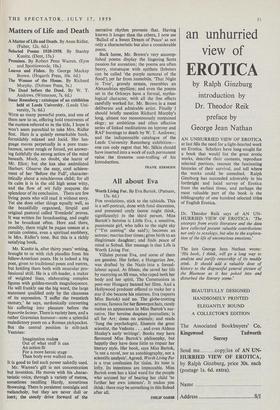Matters of Life and Death
Loaves and Fishes. By George Mackay Brown. (Hogarth Press, 10s. 6d.)
WITH so many powerful poets, and one of them new to us, offering bold treatments of the matters referred to in the title, I hope it won't seem parochial to take Mrs. Ridler first. Hers is a quietly remarkable book, formidably relaxed and lucid. Her lan- guage moves perpetually in a pure trans- lucence, never rough or forced, yet answer- ing faithfully the strong action of the mind beneath. Much, no doubt, she learnt of Mr. Eliot; but she has also assimilated Herbert. Observe the easy, cool achieve- ment of her 'Before the Fall', character- istically about a mischievous child; for all its calm it is in the old high sense witty, and the flow of wit fully prepares the splendour of its conclusion. There are few living poets who will read it without envy. Yet she does other things equally well, as the beautifully organised, limpid and original pastoral called 'Evenlode' proves. It was written for broadcasting, and ought to be broadcast often. Here and there, possibly, there might be pagan unease at a certain cosiness, even a spiritual snobbery, in Mrs. Ridler's tone. But this is a richly satisfying book, Mr. Kunitz is, after thirty years' writing, brought to us with rich plaudits from his fellow-American poets. He is indeed a big poet, given to traditional poses and metres, but holding them both with muscular pro- fessional skill. He is a rift-loader, a maker of weighted lines, elaborating complex figures with golden-mouth magniloquence. He will frankly use the big word, the large statement qualified only by the cleanness of its expression. 'I suffer the twentieth century,' he says, sardonically converting his suffering into pleasure before the hypocrite lecteur. There is variety here, and a rather Gravesian humour—note a splendid maledictory poem on a Roman pickpocket. But the central position is stilt-jack Yeatsian:
Imagination makes Out of what stuff it can An action fit For a more heroic stage Than body ever walked on.
It is good to feel such power nakedly used.
Mr. Warren's gift is not concentration but invention. He moves with his ,:harac- teristic voice, through a variety of metres, sometimes recalling Hardy, sometimes Browning. There is persistent nostalgia and melancholy, but they are never dull or inert; the steady drive forward of the narrative rhythm prevents that. Having known it longer than the others, I now see 'Ballad of a Sweet Dream of Peace' as not only a characteristic but also a considerable poem.
Back home, Mr. Brown's very accomp- lished poems display the lingering Scots passion for aureation; the poems are often heavy, statuesque with epithets (lobsters can be called 'the purple samurai of the flood'), yet far from immobile. 'That Night in Troy', gravely ornate, resembles an Alexandrian epyllion; and even the poems set in the Orkneys have a formal, mytho- logical character, with all the fine effects carefully worked for. Mr. Brown is a most deliberate and admirable artist. Finally I should briefly mention Richard Murphy's long, almost too monotonously restrained elegy; an ambitious and often effective series of linked meditations on leprosy and RAF burnings to death by W. T. Andrews; and the indispensable catalogue of the Leeds University Rosenberg exhibition— one can only regret that Mr. Silkin should have inserted into a work of such permanent value the tiresome coat-trailing of his Introduction.
FRANK KERMODE






































 Previous page
Previous page